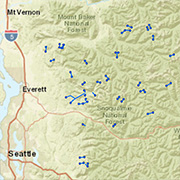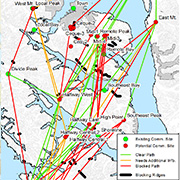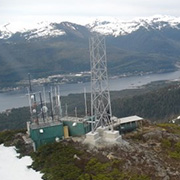Feasibility Studies
Meridian's planners and resource specialists work with site developers and their engineers to identify environmental, land use, and permitting constraints associated with new developments in natural environments. Identification, review, and selection of potential development sites are made efficient through Meridian's extensive project experience. Whether siting a hydropower project, a telecommunication site, or a fish hatchery, Meridian knows about the resources, issues, and engineering constraints to assist with site selection and evaluation in the Pacific Northwest and Southeast Alaska.
Pumped Storage Feasibility and Site Selection
Public Utility District No. 1 of Snohomish
County, with MWH Americas

Meridian staff worked with civil and
hydropower engineers to identify potential
sites that could be developed into a pumped
storage project. Topographic maps, aerial
photos and geographic information system data
were used to identify 41 potential sites in
the western Cascade Mountains of Washington.
Potential sites included those integrated with
existing hydropower projects and independent
new developments. Sites were filtered through
engineering, economic, land use, and
environmental criteria in order to evaluate
and prioritize their feasibility. Land use and
environmental constraints identified by
Meridian led to the selection of a small
number of sites for further engineering and
economic analysis. Meridian's documentation of
site attributes and selection criteria
provided a concise summary of the site
selection process for project managers.
Southeast Alaska Microwave Network Routing Study
AP&T Wireless

Meridian conducted analyses to identify a
feasible route for transmitting microwave
communication signals between Juneau and
Sitka. Topographical features, land use
designations, microwave signal transmission
constraints, maintenance access, and site
engineering design parameters were used to
identify locations for potential new
communication towers. GIS analysis was used to
identify 25 potential sites and review all
possible microwave signal paths between Juneau
and Sitka to identify a handful of feasible
locations for field evaluation. Meridian staff
led an engineering reconnaissance survey by
helicopter to verify the feasibility of
selected sites.
Sockeye Collection Facility Feasibility Assessment
Seattle Public Utilities, with McMillen
Jacobs Associates
Meridian is collaborating with McMillen Jacobs
to assess the feasibility of alternative adult
sockeye collection devices in support of
Seattle's Cedar River Sockeye hatchery
program. Options for safer and more effective
structures are being evaluated. Meridian is
assessing the environmental compliance
ramifications of each alternative to recommend
the most permittable option.
Shortnose Sucker Conservation Aquaculture Assessment
US Fish and Wildlife Service, with DJ
Warren & Associates
Since being listed as endangered in the
Klamath River Basin, the USFWS has sought to
protect the diminishing habitat of the native
Lost River sucker, but ultimately chose to
evaluate hatchery options to preserve the
species and aid in their recovery. Meridian
was part of the team that evaluated eight
sites throughout the basin to assess the
following: a water supply that can be
permitted, sufficient space for hatchery
facilities and operator housing, biosecurity
for a listed species, site access, and
potential to obtain regulatory approval.
Analyses and recommendations were provided to
the USFWS.
Communication Site Power Supply Feasibility
AP&T Wireless

Meridian staff identified four potential
routes for the installation of a power line to
a remote mountain-top communication site. A
direct power line connection to the
communication site would reduce costs
associated with transporting fuel by
helicopter, storing diesel fuel on the
mountain-top, and reduce the risk associated
with refueling during adverse weather
conditions. Engineering, environmental, land
use, and permitting information was used to
evaluate route options, followed by field
investigations to determine the most feasible
route to construct.
Aquaculture Feasibility Assessments
Various Federal, Tribal and Private
Clients
Meridian has contributed to numerous
aquaculture program feasibility assessments
throughout the western US for both production
and conservation facilities rearing anadromous
and ESA-listed fish. For proposed facilities,
our role typically is to assess and compare
environmental compliance requirements of
siting alternatives. For modifications to
existing facilities, we identify the
permitting requirements and any significant
hurdles that may be encountered. We have
worked on programs intended to produce
sockeye, sturgeon, Chinook salmon, coho
salmon, steelhead, ESA listed suckers, and
burbot.

